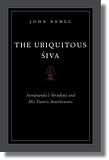The Ubiquitous Siva
Nemec, John:
The Ubiquitous Śiva : Somānanda's Śivadṛṣṭi and his Tantric Interlocutors / John Nemec. - New York : Oxford Univ. Press, 2011. - x, 436 S. - (AAR Religions in Translation)
ISBN 978-0-19-979545-1
US$ 99,00 / £ 60,00 (Hardcover)
ISBN 978-0-19-979546-8
US$ 49,95 / £ 32,50 (Paperback)
DDC: 294.52
-- Angekündigt für Juni 2011 (USA), für Oktober 2011 (UK) --
Beschreibung
John Nemec examines the beginnings of the non-dual tantric philosophy of the famed Pratyabhijna or "Recognition [of God]" School of tenth-century Kashmir, the tradition most closely associated with Kashmiri Shaivism. In doing so it offers, for the very first time, a critical edition and annotated translation of a large portion of the first Pratyabhijna text ever composed, the Śivadṛṣṭi of Somānanda. In an extended introduction, Nemec argues that the author presents a unique form of non-dualism, a strict pantheism that declares all beings and entities found in the universe to be fully identical with the active and willful god Siva. This view stands in contrast to the philosophically more flexible panentheism of both his disciple and commentator, Utpaladeva, and the very few other Saiva tantric works that were extant in the author's day. Nemec also argues that the text was written for the author's fellow tantric initiates, not for a wider audience. This can be adduced from the structure of the work, the opponents the author addresses, and various other editorial strategies. Even the author's famous and vociferous arguments against the non-tantric Hindu grammarians may be shown to have been ultimately directed at an opposing Hindu tantric school that subscribed to many of the grammarians' philosophical views. Included in the volume is a critical edition and annotated translation of the first three (of seven) chapters of the text, along with the corresponding chapters of the commentary. These are the chapters in which Somānanda formulates his arguments against opposing tantric authors and schools of thought. None of the materials made available in the present volume has ever been translated into English, apart from a brief rendering of the first chapter that was published without the commentary in 1957. None of the commentary has previously been translated into any language at all. [Verlagsinformation]
Inhalt
Acknowledgments. vii
Abbreviations. ix
PART I. INTRODUCTION TO THE TRANSLATION
1. Introduction. 1
2. About this book. 3
SOMANANDA'S WORKS AND HIS BIOGRAPHY
3. The Author and His Works. 12
4. Somānanda's Biography and Autobiography. 19
THE AUTHOR'S THOUGHT AND THE INTELLECTUAL HISTORY OF THE PRATYABHIJÑĀ
5. Somānanda's 'Settled Opinion' (siddhānta). 25
6. Divergences Between the Writings of Somānanda and Utpaladeva. 31
7. The Use of Trika and Technical Terminology in the Śivadṛṣṭi. 39
8. The Influence of the Trika VBh on the Śivadṛṣṭi. 44
SOMANANDA'S TANTRIC INTERLOCUTORS, AND THE PHILOSOPHY OF THE GRAMMARIANS
9. The Tantric Post-Scriptural Schools and Authors Known to Somānanda. 51
10. The Śivadṛṣṭi and the Spanda School. 53
11. Krama Influences on the Śivadṛṣṭi. 56
12. Somānanda and the Śaiva Siddhānta. 58
13. The Śivadṛṣṭi and the Philosophy of the Grammarians. 59
14. Bhaṭṭa Pradyumna and his Tattvagarbhastotra. 67
15. Conclusions: Somānanda's Śivadṛṣṭi and the Emergence of the Pratyabhijñā. 76
ABOUT THE EDITION AND THE TRANSLATION
16. The Manuscripts of the Śivadṛṣṭi. 79
17. About the Edition. 82
18. About the Translation. 91
PART II. THE TRANSLATION (Śivadṛṣṭi and Śivadṛṣṭivṛtti)
Chapter One: Śiva and His Powers. 99
Chapter Two: The Arguments Against the Grammarians. 146
Chapter Three: The Arguments Against the Śāktas. 211
PART III. THE EDITION (Śivadṛṣṭi and Śivadṛṣṭivṛtti)
Critical Edition of Chapter One. 275
Critical Edition of Chapter Two. 304
Critical Edition of Chapter Three. 350
Bibliography. 397
Alphabetical Index of the Half-Verses. 417
Index of References to the IPK and IPVr. 427
Index of Key Authors, Terms and Textual References. 431
Autor
JOHN NEMEC, Assistant Professor of Religious Studies, University of Virginia. Profile page.
Quellen: Oxford University Press (USA); Oxford University Press (UK); WorldCat; Amazon; Google Books
Ähnlich
- An Enquiry into the Nature of Liberation
- Abhinavagupta's Hermeneutics of the Absolute Anuttaraprakriyā
- Smets: La question de la non-dualité dans la Jaiminiyasamhita
- Dharma Patanjala
- Yogi Heroes and Poets
- Suksmagama
- Wege zum Heil(igen)?
- Davis: The Bhagavad Gita
- Rao: Re-figuring the Rāmāyaṇa as Theology
- Oliver: Hinduism and the 1960s

